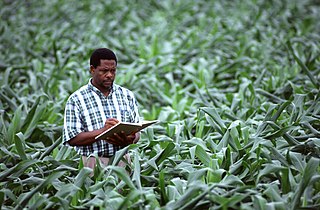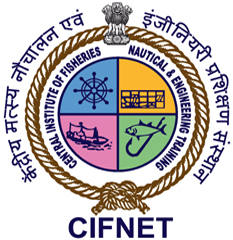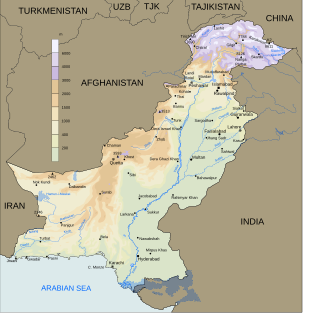The following outline is provided as an overview of and topical guide to agriculture:

Tamil Nadu Agricultural University (TNAU) is the state agricultural university of Tamil Nadu Headquartered in Coimbatore, Tamil Nadu, India.

Assam Agricultural University (AAU) is an agricultural education state university which was established on 1 April 1969 in Jorhat in the state of Assam, India. The jurisdiction of the university extends to the entire State of Assam with regard to teaching, research and extension education in the field of agriculture and allied sciences. The university has a number of campuses with its headquarters at Borbheta, Jorhat.Assam Assembly Passes Veterinary And Fishery University Bill The Assam government has decided to form a new university by merging the existing veterinary colleges in the state and the fishery college at Raha.This new University will consist of five Krishi Vigyan Kendra's viz., Kamrup, Barpeta, Baksa, North Lakhimpur and Morigaon under it and the two research stations viz., Mandira and Byrnihat.

An agriculturist, agriculturalist, agrologist, or agronomist is a professional in the science, practice, and management of agriculture and agribusiness. It is a regulated profession in Canada, India, the Philippines, the United States, and the European Union. Other names used to designate the profession include agricultural scientist, agricultural manager, agricultural planner, agriculture researcher, or agriculture policy maker.

The Central Institute of Fisheries Nautical and Engineering Training (or CIFNET) formerly known as the Central Institute of Fisheries Operatives, is a marine studies centre located at Kochi, India. Maintained by the Department of Fisheries and Animal Husbandry and Dairying of the Government of India, the institute was set up to aid research and development in the field.

Dr. Balasaheb Sawant Konkan Krishi Vidyapeeth, formerly Konkan Krishi Vidyapeeth, is an agricultural university at Dapoli in Ratnagiri district of the Indian state of Maharashtra. It was established on 18 May 1972 as Konkan Krishi Vidyapeeth, and got its present name on 12 February 2001 in memory of third Chief Minister of Maharashtra Shri. P. K. Sawant. Its research centre at Karjat has developed some patented varieties of rice. Its major focus areas are rice, horticulture and fisheries. In 1997, it received the Best Institute Award of the Indian Council of Agricultural Research. Dr. Sanjay G. Bhave is the 16th Vice Chancellor of this University, he was appointed by Chancellor on 07 June 2023.
The College of Fisheries, Mangalore, Karnataka is a fisheries education and research institute in India. It was established in 1969 by the University of Agricultural Sciences, Bangalore. The college has become part of the newly established Karnataka Veterinary, Animal and Fisheries Sciences University, Bidar.

The West Bengal University of Animal and Fishery Sciences (WBUAFS) is a public state veterinary university in West Bengal, India. It was established on 2 January 1995 by an Act of the West Bengal legislature. It imparts education and training in veterinary and animal sciences, dairy sciences, and fishery sciences.

Shanghai Ocean University (SHOU) is a public research university in Shanghai, China, dedicated to the study of aquaculture, marine science and engineering. This university is a part of the national Double First-Class Construction Initiative. It is co-established by the Ministry of Natural Resources, the Ministry of Agriculture and Rural Affairs and the Shanghai Municipal Government.

The Central Institute of Fisheries Education (CIFE) is a Deemed to be a University and institution of higher learning for fisheries science in Mumbai, India. CIFE has over four decades of leadership in human resource development with its alumni aiding in the development of fisheries and aquaculture worldwide, producing notable contributions to research and technological advancements to their credit. It was ranked 9th in India by the National Institutional Ranking Framework in the agriculture and allied sectors ranking for 2024.

Fishing is a major economic activity in Portugal. The country has a long tradition in the sector, and is among the countries in the world with the highest fish consumption per capita. Roman ruins of fish processing facilities were found across the Portuguese coast. Fish has been an important staple for the entire Portuguese population, at least since the Portuguese Age of Discovery.

The fishing industry plays a significant part in the national economy of Pakistan. With a coastline of about 1,120 km, Pakistan has enough fishery resources that remain to be developed. Most of the population of the coastal areas of Sindh and Balochistan depends on fisheries for livelihood. It is also a major source of export earning.

The Kerala University of Fisheries and Ocean Studies (KUFOS) is a university established by the Government of Kerala devoted to studies in fisheries and ocean sciences. The bill seeking to establish the university was passed by the Kerala Legislative Assembly on 30 December 2010. KUFOS has its headquarters in the premises of the College of Fisheries, Panangad, near Madavana Junction along the Kochi Bypass. The College of Fisheries, established in 1979, was a constituent college of the Kerala Agricultural University. KUFOS is the first university in India exclusively dedicated to studies in fisheries and allied disciplines. The university was inaugurated and dedicated to the nation in a function held at the campus of the College of Fisheries, Panangad, on 20 February 2011.
The Fisheries College and Research Institute (FCRI) is situated in Thoothukudi, Tamil Nadu, India.
The Master of Fisheries Science (M.F.Sc) is a master's degree for studies in fisheries science in India. Fisheries science is the academic discipline of managing and understanding fisheries. It is typically taught in a university setting, and can be the focus of an undergraduate, postgraduate or Ph.D. program. Master level fisheries courses were started by the state agricultural universities to make available the much needed technically competent personnel for teaching, research and development and transfer of technology in the field of fisheries science.
Central Institute of Brackishwater Aquaculture (CIBA) is one of the research institutes under Indian Council of Agricultural Research (ICAR), New Delhi to serve as the nodal agency for catering to the needs of the brackishwater aquaculture research in India. The institute is headquartered at Santhome High Road, Raja Annamalai Puram, Chennai with a research centre at Kakdwip in West Bengal and an experimental field station at Muttukadu, roughly 30 km to the south of Chennai. The institute works under the Ministry of Agriculture, India.

Mudnakudu Channabasappa Nandeesha was a development researcher, innovative aquaculture development worker and educator. He is recognized for making critical contributions to the rapid growth of aquaculture by applying research to key bottlenecks to fish production. In India, he conducted successful pioneering field tests of Ovaprim, an ovulating agent, under different agro-climatic conditions to help remove a critical early barrier for freshwater fish breeding. His significant scientific contributions include simplified breeding technology for cyprinids and development of feeds and feeding techniques appropriate to rural aquaculture, and helping improve and spread the practices of small scale fish farming at a time when most attention was on large scale producers. He wrote a regular and widely acclaimed column in Network of Aquaculture Centers in Asia-Pacific (NACA) Aquaculture Asia magazine on farmer innovations in aquaculture. He was described as an "ambassador for aquaculture" and was especially noted for promoting aquaculture for the disadvantaged poor households and women. Along with Michael New, in 2003 he was a founding member of the not-for-profit organisation, Aquaculture without Frontiers. While encouraging poor people to take up aquaculture, he was also a pioneer in promoting equity for women, who had been neglected in the aquaculture boom. Throughout his career, he was in the forefront of initiatives to upgrade the professionalism of fisheries and aquaculture experts, and inspired peers and students in critical new directions.

Dr. Hiralal Chaudhuri was an Indian Bengali fisheries scientist. He is known as the "father of induced breeding" of the carp. The Blue revolution in India was developed on the basis of his work on seed production technology through Hypophysation. He later led the way in intensive mixed farming to increase fish production in ponds.
Subbanna Ayyappan is an Indian aquaculture scientist hailing from the Karnataka State who has held several key positions in various Govt organisations related to agricultural science. He was the Director-General of Indian Council of Agricultural Research (ICAR) and Secretary to Government, Department of Agricultural Research and Education (DARE) during Jan 2010 – Feb 2016. He was also the Chancellor of Central Agricultural University, Manipur. He was instrumental in bringing about the Blue Revolution in India. He was the first non-crop scientist to head the ICAR.

College of Fisheries, Raha (COF) is an academic institution located at Raha, Assam. It was established in 1988 to offer specialized education in fisheries science, aiming to provide technical expertise in this field, particularly in the context of the North Eastern region of India.












